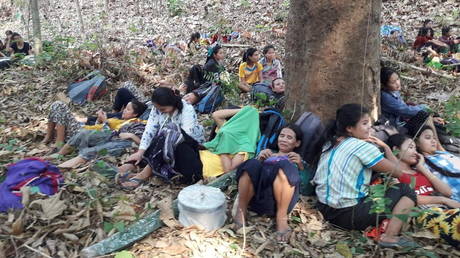
People trying to get out of Myanmar amid a violent military crackdown on dissent after the February 1 coup are being refused entry to neighboring Thailand and India, activists and media reports claim.
Around 2,000 refugees crossed into Thailand over the weekend after villages along the border area were targeted by airstrikes, but were forced back into Myanmar, David Eubank, the founder of the Free Burma Rangers aid agency, said on Monday.
Myanmar’s army launched airstrikes in the southeastern Karen state in response to an attack on a military outpost by a local ethnic armed group opposed to the coup, though no fatalities have been reported.
The refugees have now returned to the Ee Thu Hta displacement camp on the Myanmar side of the border, Eubank said.
A Human Rights Watch senior researcher on Thailand, Sunai Phasuk, blasted the actions of the Thai authorities as “heartless and illegal” on Twitter, calling upon the country to let the refugees in.
However, an unnamed Thai provincial official denied the reports, telling Reuters that the Myanmar refugees were still inside Thailand. “They are in Thai territory by the Salween River, but they haven’t come further. It’s under army management,” he said.
Thailand’s prime minister, Prayut Chan-ocha, acknowledged problems along the country’s 2,416km border with Myanmar, saying: “We don’t want to have mass migration into our territory, but we will consider human rights, too.”
Dozens of people have also been crossing into India from Myanmar on a daily basis in the past few weeks. However, Indian media report that in a confidential letter, authorities in the border state of Manipur have ordered district heads to curb the illegal entries.
Refugee camps shouldn’t be set up by either the administration or by civil society organizations, the leaked missive reportedly stated, adding: “People trying to enter/seek refuge should be politely turned away.” Exceptions can only be made for those with serious injuries, the letter read, according to media reports.
The authorities in both Thailand and India have been cautious in reacting to the coup in neighboring Myanmar, speaking out against the violence and calling for calm, but stopping short of criticizing the military or introducing sanctions like some Western governments.
Myanmar has been gripped by mass protests since early February, when the army arrested democratically-elected leader Aung San Suu Kyi and other top-level officials over claims of election fraud. The protests have been met by the military, which has deployed live ammunition and beat demonstrators, killing at least 459 people since the coup, according to figures from the country’s Assistance Association for Political Prisoners.
The deteriorating situation in the Southeast Asian country will be the subject of a UN Security Council meeting on Wednesday, diplomats said on Monday.
Think your friends would be interested? Share this story!




